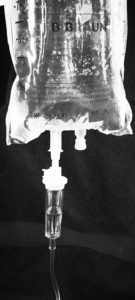Loebsack Hears About Health Care Concerns From MHP

Congressman Dave Loebsack visited Mahaska Health Partnership on Friday and participated in a roundtable discussion.
Oskaloosa, Iowa – Iowa Congressman Dave Loebsack stopped by Mahaska Health Partnership on Friday to get updated on how he can help serve the hospital and its patients.
After some brief introductions, Loebsack started off the question and answer session by opening the floor to those in attendance. Mahaska Health Partnership interim CEO Chris Jepsen asked Loebsack what was being done to help remedy the shortage of ubiquitous intravenous bags of saline solution available to the medical field.
The shortage has been a problem since 2014 but has gotten worse since last fall.
Shortages have caused concerns after the largest producer of the product, located in Peurto Rico, was heavily damaged and made supplies nearly non-existent.
Jepsen asked if there would be an opportunity to get into emergency stock held by the federal government to help alleviate the shortage, especially as flu season is now impacting health care providers. “We are in such a crisis. Everybody is trying to steal from everybody. With the reimbursements going down and what we’re having to pay for it to get supplies now is unrealistic.”
“From a clinical standpoint, we’re almost to that point where we’d have to cancel elective surgeries in some cases,” added Jepsen.
“It impacts care, and it also impacts us financially,” added Jason Feucht, Chief Financial Officer for Mahaska Health Partnership.
The shortage is a national concern said the roundtable of health care providers.
“I am not aware of any attempts to try to deal with the issue,” said Loebsack, who says that he will investigate what can be done to help alleviate the problem, “if there is anything.”
Expenses incurred by local hospitals due to changes in regulations from both the federal and state government are an issue. “Thinking about how those federal regulations trickle down into these contracts for us to be able to provide the services make that much more onerous for us as an organization to be able to do that,” added Andrea Hagist, Executive Director of Clinics for Mahaska Health Partnership.
Loebsack agreed, “A big part of what I do is deal with rural areas. Clearly, some of the rules and regulations that come down from the federal government are less applicable, let’s say, to rural areas than they are to urban areas.”
Concerns for childrens health funding were also discussed. Those programs are often known as Hawk-i in Iowa. Loebsack said he has concerns about how that program would be paid for. The current funding extension takes the program through March but will leave families and state governments wondering about future funding.
Loebsack says he hopes that a long-term extension of funding for the program known as CHIP will pass the House in the near future, and then secure programs like Hawk-i.
Loebsack then quizzed the panel about Medicaid privatization in Iowa and what experience and concerns they have about the program in Iowa.
“Huge administrative burden,” said one of the panel members. “Understanding the rules.”
Those rules can vary greatly, and little is standardized, “they all three have different approaches to things” said one commenter about the companies administrating the Medicaid program for the State of Iowa, otherwise known as Managed Care Organizations or MCO’s.
“Layers of additional overhead requirements on us to figure it out,” added Feucht.
Some of the issues include billing for emergency services; an example was given during the discussion session.
“One of those non-emergent codes was suicidal ideation. So if you came in feeling suicidal, your visit was considered non-emergent and they [MCO’s] wanted that money back. You had to have actually acted on it, and had a suicide attempt for that visit to be deemed emerged,” explained Hagist.
Hagist said the hospital has spent a large amount of time, effort and financial resources appealing many of the cases where MCO’s clawed back money from the medical provider.
“It’s been a nightmare,” added Feucht, who said in that situation, the suicidal patient was incurring the same cost if they had or had not attempted. “To us, it’s the same type of care.”
Local case management was also a point of discussion, and how it is impacting the most vulnerable in society.
The MCO’s took over the private and public case management in the state. Mahaska County and their longstanding case management system was also dismantled by the changes.
“They [MCO’s] put them out of business because they no longer will contract with them like they originally had promised,” said Hagist. That lack of local case management and the ability for health providers to coordinate locally may be hindering services to those in need.
Loebsack understands that the privatization is a state issue, but “I get involved because it’s a federal program.”
Mahaska Health Partnership Board of Trustees Chairperson David Langkamp said that he, at times, questions the vision of our politicians and where all of these issues are going. “The next thing I question is the procrastination of getting something done.”
Langkamp says that working on and “actually” solving an issue. “My frustration, and I’m not picking on you [Loebsack] as an individual, but my frustration with politicians is the lack of vision, the procrastination, and just telling us what we think we want to hear.”
“You all create a lot of difficulty for critical access hospitals,” said Langkamp. “I’d just like for something to get done.”
“Those three things, I won’t disagree with you at all,” said Loebsack.
“I’m not here to attack you today,” added Langkamp. “But I’m just here if I can send a message back; hey guys, let’s do something.”
Loebsack also said that representing rural Iowa can be difficult in Washington D.C., as the population continues to shift towards a more urban setting.
“Much of America is out of sight, out of mind, and it’s rural America. “You talk to people, and they just don’t get it, and they don’t necessarily want to get it either.”
“I have more of a battle within my own party because most of the people in Congress, in the Democratic Party, are from urban areas,” said Loebsack, who says he has to remind others that poverty, drug addiction is also in rural America. “The things that you talk about in big cities, we have those things in rural America.”











